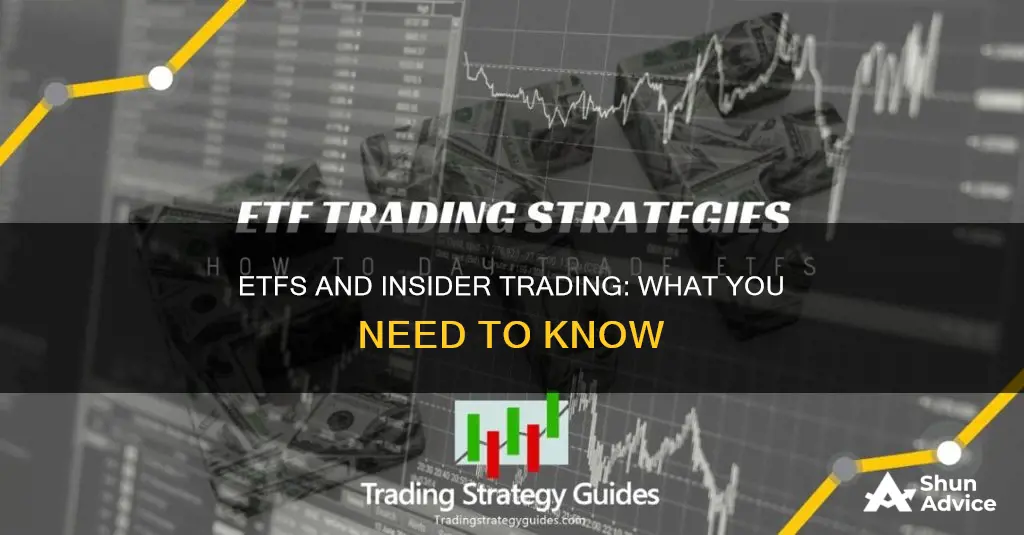
Investing in an ETF that contains your company's stock may be considered insider trading if you use non-public information to make a trading decision. Insider trading is not just about owning stock in a company but also about using information that only an employee would have to make decisions about buying or selling that stock. The SEC is increasingly focused on cracking down on insider trading, and executives who sell their company's securities and make a profit within a six-month window must return all profits to the company. While some firms explicitly ban ETFs that hold companies they have large stakes in, others set a threshold for the concentration of a fund's investment in a particular company before it is considered a violation.
| Characteristics | Values |
|---|---|
| Is investing in ETFs considered insider trading? | No, not if you are not trading based on non-public information. |
| What if the ETF contains your company's stocks? | It depends on your company contract. If it only mentions company stock, you should be fine. |
| What if you have non-public information? | If you have non-public information and trade based on it, you may be committing insider trading. |
| How can you check if a company's shares are included in an index? | iShares provides a list of companies where you can search by name. |
What You'll Learn

ETF trading and insider knowledge
Insider trading is a serious issue that can have severe legal consequences. It is important to understand what constitutes insider trading and how it relates to trading Exchange-Traded Funds (ETFs).
Insider trading occurs when an individual with access to non-public, material information about a company uses that knowledge to make trading decisions involving the company's securities. This can include buying or selling the company's stocks, but also extends to derivatives and sometimes ETFs.
The relationship between insider trading and ETF trading is complex. On the one hand, ETFs are baskets of different securities, often including stocks from various companies, which makes it harder to benefit directly from insider information. However, if an individual has insider knowledge about a specific company and knows that an ETF contains a significant portion of that company's stock, they may still be tempted to trade the ETF to gain an advantage.
For example, if an individual works for Company A and knows that an upcoming announcement will cause its stock price to rise, they may consider buying an ETF that includes Company A's stock, especially if it is one of the larger constituents of the ETF. This would give them indirect exposure to the expected stock price increase while potentially masking their trade as a general investment in the ETF.
Legal and Ethical Considerations
The legal implications of such a trade depend on various factors, including the jurisdiction, the individual's position within the company, the specifics of their employment contract, and the overall composition of the ETF.
In the United States, the Securities and Exchange Commission (SEC) regulates insider trading and has been increasingly focused on enforcing stricter accountability. While simply owning company shares does not make one an insider, having access to non-public information and using it to trade can constitute insider trading.
To avoid any potential legal issues, it is crucial to review and understand any insider trading policies or restrictions outlined by one's employer. Some companies may have specific thresholds or guidelines regarding the concentration of a particular stock within an ETF and the permissibility of trading it.
It is worth noting that even if a trade does not violate any laws or company policies, it could still raise ethical concerns. The appearance of impropriety or the potential for regulatory scrutiny should be carefully considered before making any trades that could be construed as taking advantage of insider knowledge.
Best Practices
To ensure compliance and avoid any potential issues, individuals should take the following steps:
- Review and understand their company's insider trading policies and any relevant legal regulations.
- Consult with their company's compliance or legal department if there is any uncertainty about a potential trade.
- Avoid trading ETFs that include a significant portion of their employer's stock, especially if they have access to non-public information.
- Exercise caution when trading ETFs in industries where insider knowledge is more prevalent, such as the health care and technology sectors.
- Be mindful of trading ETFs with high liquidity, as these may provide greater opportunities for strategic trading and potential abuse.
In conclusion, while ETF trading may not always constitute insider trading, it is important to approach such trades with caution and a thorough understanding of the legal and ethical implications.
ETFs: Minimum Investment Requirements and How They Work
You may want to see also

ETF composition and insider trading
Insider trading is a complex issue that requires careful consideration of both legal regulations and company-specific policies. In the context of Exchange-Traded Funds (ETFs), the situation becomes even more intricate due to the diverse composition of these investment vehicles. Here's a detailed exploration of the relationship between ETF composition and insider trading:
Understanding Insider Trading
Insider trading occurs when individuals with access to non-public, material information about a company use that knowledge to make trading decisions involving the company's securities. This can include buying or selling the company's stocks, but also extends to derivatives and other related financial instruments. The key factor is the use of privileged information to gain an advantage in the market.
ETF Composition and Its Impact on Insider Trading
ETFs are baskets of securities that can include stocks, bonds, commodities, or other assets. They are designed to track an underlying index or sector, providing investors with diversified exposure to a particular market or investment strategy. The composition of an ETF can vary widely, from broad-based funds that hold hundreds of stocks across different industries to more specialised funds that focus on a specific sector or theme.
When it comes to insider trading, the composition of an ETF is crucial. If an individual has access to non-public information about a specific company within an ETF, they may be tempted to trade the ETF based on that knowledge. However, the impact of a single company within an ETF is usually diluted due to the diversification of holdings. As a result, the potential for direct benefit from insider information is limited.
Legal and Ethical Considerations
While trading an ETF that includes a company an individual has insider information about may not provide a direct and significant benefit, it still raises legal and ethical concerns. Regulators, such as the Securities and Exchange Commission (SEC) in the United States, are increasingly focused on cracking down on insider trading and upholding the integrity of the financial markets.
To avoid any potential legal repercussions, it is essential to understand the specific regulations and laws pertaining to insider trading in your jurisdiction. Additionally, companies often have their own internal policies and guidelines regarding employee trading activities, which should be carefully reviewed and adhered to.
Practical Scenarios
- Scenario: Broad-Based ETF with Minimal Exposure: An individual works for a large company in the technology sector. This company represents less than 1% of a broad-based technology ETF. The individual possesses non-public information indicating an upcoming positive earnings report for their company. In this case, trading the ETF is unlikely to provide a substantial advantage, as the impact of the company's performance is diluted within the broader fund.
- Scenario: Sector-Specific ETF with Significant Exposure: An employee has access to confidential information about an upcoming merger involving their company in the healthcare sector. The company comprises 10% of a healthcare-focused ETF. In this scenario, trading the ETF based on insider information could potentially provide a more direct benefit, as the company's performance will have a more noticeable impact on the fund's overall performance.
- Scenario: Indirect Impact on Competitor: An individual works for a company that is a direct competitor to another firm within an ETF. They have insider knowledge about their company's upcoming favourable earnings report, which is likely to negatively affect their competitor's stock price. Trading the ETF based on this information could be considered insider trading, as it still involves using non-public knowledge to gain an advantage, even though the information is not directly related to a company within the ETF.
Best Practices and Recommendations
To navigate the complex landscape of ETF composition and insider trading, here are some recommended practices:
- Disclosure and Compliance: Employees should disclose their trading activities to their company's compliance department and seek guidance on interpreting internal policies. Full transparency can help ensure that trading activities do not inadvertently violate company policies or legal regulations.
- Avoid Trading Related ETFs: If an individual possesses material, non-public information about their company, it is generally advisable to avoid trading any ETFs that include the company's securities or those of its direct competitors. This helps mitigate any potential conflicts of interest or appearances of impropriety.
- Understand Legal Definitions: Insider trading laws can vary across jurisdictions, and it is essential to understand the specific definitions and requirements in your region. Consult with legal professionals or compliance experts to ensure your trading activities comply with the applicable laws and regulations.
- Monitor ETF Holdings: Stay informed about the composition of the ETFs you are invested in or plan to trade. Regularly review the holdings of these funds to identify any potential conflicts of interest or exposure to companies for which you have insider information.
- Establish Trading Plans: Consider implementing trading plans that are pre-scheduled and do not rely on any non-public information. These plans can help demonstrate that your trading activities are based on systematic strategies rather than insider knowledge.
In conclusion, the relationship between ETF composition and insider trading is complex and multifaceted. While the diversified nature of ETFs may reduce the direct impact of insider information, it is crucial to remain vigilant and adhere to legal and ethical standards. By following best practices and seeking appropriate guidance, individuals can navigate the complexities of ETF composition and minimise the risks associated with insider trading.
ETFs: Understanding Their Status Under the 1940 Act
You may want to see also

Insider trading: individual stocks vs ETFs
Insider trading is a serious issue that can result in civil penalties and even jail time. It is essential to understand what constitutes insider trading and the regulations surrounding it.
Individual Stocks
Investing in individual stocks of a company you work for can be a complex issue when it comes to insider trading. If you are an employee with access to non-public information that could impact the stock price, making decisions to buy or sell that stock based on this knowledge is considered insider trading. This applies even if the stock is a small part of a larger fund, such as an ETF. It is essential to review your company's insider trading policy and seek guidance from the compliance department or legal professionals to ensure you are compliant with regulations.
ETFs
ETFs, or Exchange-Traded Funds, are investment funds that hold multiple underlying assets, such as stocks, bonds, or cryptocurrencies. They offer a cost-effective and diversified investment option for individuals. When it comes to insider trading, the key consideration with ETFs is whether the investor has access to non-public information that could impact the price of the underlying assets. If an investor uses their insider knowledge to trade ETFs that hold the securities of their company, it may be considered insider trading.
Key Differences
The main difference between investing in individual stocks and ETFs in the context of insider trading is the level of direct involvement with the company's securities. With individual stocks, the connection is more apparent, as you are directly buying or selling the company's shares. On the other hand, ETFs provide a layer of separation since you are investing in a fund that holds a basket of securities, including the company's stock. This distinction is essential, as it may impact the severity of any potential consequences.
Prevalence of Insider Trading in ETFs
According to a study by Eglīte, Štaermans, Patel, and Putniņš, insider trading in ETFs is more common than previously thought. They found that insiders traded ETFs to profit from price-sensitive news, taking advantage of the cost-effectiveness and liquidity of ETFs. This type of "shadow trading" has gone largely undetected, and regulators may need to broaden their surveillance activities to address this issue.
In conclusion, whether investing in individual stocks or ETFs, it is crucial to adhere to insider trading regulations. While the specifics may vary depending on your jurisdiction and company policies, the key principle is to avoid trading based on non-public information that could impact the stock price. Always seek guidance from legal professionals or your company's compliance department if you are unsure about a particular investment.
ETFs and Halal Investing: What You Need to Know
You may want to see also

Insider trading: legality and punishment
Insider trading is the buying or selling of a company's securities by individuals with access to non-public, material information. This can include corporate officers, directors, employees, and even friends and family members who have received tips from insiders. While not all forms of insider trading are illegal, it is a contentious issue that has long plagued financial markets.
The Securities and Exchange Commission (SEC) in the US has introduced rules and regulations to prevent improper insider trading activities and hold violators accountable. The SEC requires insiders to file reports of their trades, which are made public.
Insider trading is illegal when individuals with access to material, non-public information use that knowledge to trade securities. This can involve trading by insiders, "tipping" or sharing confidential information with others, misappropriation by lawyers or consultants, and front-running by brokers or analysts.
Illegal insider trading carries severe penalties, including civil and criminal fines, imprisonment of up to 20 years, and being barred from serving as an officer or director of a public company. The SEC can impose civil fines of up to three times the profit gained or loss avoided, while individuals may also be required to disgorge or return any ill-gotten gains.
To detect insider trading, the SEC employs market surveillance, tips and complaints from investors and whistleblowers, collaborative efforts with other regulators, options trading analysis, and social media monitoring.
It's important to note that the line between legal and illegal insider trading can be blurry. As such, individuals should exercise caution and seek legal counsel if they are unsure about the legality of their actions.
ETFs: A Beginner's Guide to Exchange-Traded Funds
You may want to see also

Insider trading: compliance and regulation
Insider trading is a highly regulated area, with the Securities and Exchange Commission (SEC) keeping a "tight lid" on any executive misconduct. The SEC has been increasing its focus on insider trading, updating its rules to increase accountability for corporations and broker-dealers. For example, broker-dealers must now maintain internal restricted lists of securities for mergers and other deals that could be manipulated by insider trading.
Insider trading is defined as making decisions about buying or selling stocks using information that only an employee of the company would have. It is not simply owning stock in the company you work for. The SEC considers it insider trading when individuals trade on disclosures, i.e., when they act on material non-public information. This is indicated by a stock price moving higher or lower before any public announcement, which regulators view as a sign of non-public knowledge being used.
In recent years, there have been cases of individuals using exchange-traded funds (ETFs) to conceal insider trading. Insiders have been trading ETFs to profit from price-sensitive news, taking advantage of the cost-effectiveness and liquidity of ETFs. This type of shadow trading has been found to be prevalent in the healthcare and technology sectors, where secrecy levels are higher and stock prices tend to increase significantly after acquisition bids.
To avoid any potential issues with insider trading regulations, individuals should carefully review their company's insider trading policies and compliance guidelines. Some companies may have specific restrictions on trading ETFs that hold a certain percentage of their company's stock. It is also important to note that insider trading laws may vary by country. Seeking guidance from the corporate investor relations department or corporate secretary can help individuals understand their insider status and any associated compliance requirements.
ETFs and Unit Investment Trusts: What's the Difference?
You may want to see also
Frequently asked questions
Insider trading is when someone with access to non-public information about a company—usually an employee—uses that information to make a decision about buying or selling that company's stock.
It depends. If you are making decisions about buying or selling the ETF based on non-public information, then it may be considered insider trading. However, if you are simply holding the ETF and not actively trading based on inside information, it is unlikely to be considered insider trading.
This is unlikely to be considered insider trading unless you are providing non-public information to the investment managers of the fund or making trading decisions based on inside information. Simply owning the ETF is not enough to constitute insider trading.
Yes, it is important to review your company's insider trading policy and compliance guidelines. Some companies may have restrictions on investing in certain ETFs or may require pre-clearance for trades. It is also essential to understand the relevant laws and regulations regarding insider trading to avoid any legal issues.







